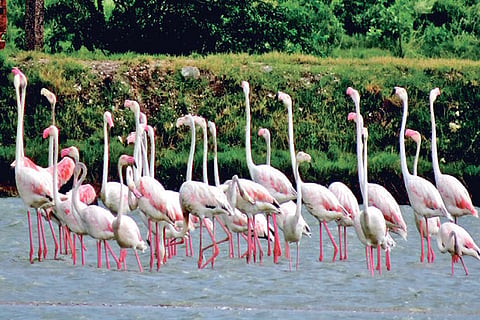

Madurai
According to Davidson Sargunam, International Union for Conservation of Nature (IUCN) member for Ecosystem Management, the migratory birds usually arrive from mid-August and leave by February end or early March. But, this year some birds arrived by late September only, that too with less population count.
Migratory birds such as marsh sandpiper, red shank, kentish plover, lesser sand plover, spotted sandpiper, common sandpiper, little stint, little tern, greater crested tern, flamingos and local birds as painted stork, spot billed pelican, coot, herons, open billed stork, ash heron, spot billed duck, could be sighted in the reserves.
Duck species are conspicuously not spotted this year. Usually migratory ducks such as shoveler, garganey, Eurasian pin tail duck, and wigeon could be seen from September.
The local birds such as painted stork, pelican, spot-billed duck and coot could be seen in around three to four thousands, but only a handful is spotted this year. The month of October experienced two thunderstorms and it could have caused habitat disturbance, he told DT Next.
Davidson also attributed the delay to climate change as many European countries had become hotter and fall and winter might have set late.
The local reasons attributed for the dwindling population of birds are heavy encroachments of wetland water bodies like in Manakudy where illegal fishing is going on, invasive alien aquatic species as water hyacinth in Theroor and Suchindram, habitat destruction and devastation, fishing in habitat areas, illegal culture of lotus leaves and flowers, silting of water sources, human interference in habitat areas, hunting and poaching, pollution and channelizing polluted waste into water bodies.
Davidson charged that all these Reserves were not monitored properly besides providing congenial, protected habitats for the birds by the respective departments.
Visit news.dtnext.in to explore our interactive epaper!
Download the DT Next app for more exciting features!
Click here for iOS
Click here for Android